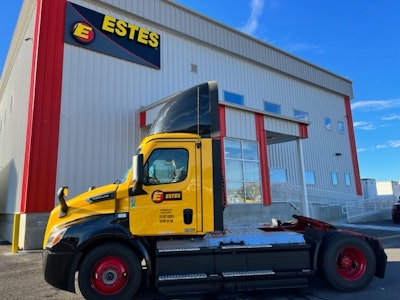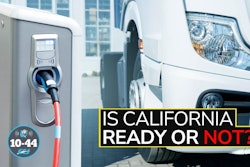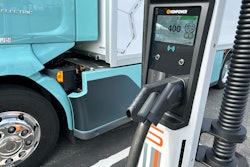
Estes Express Lines has added its first zero-emission electric Class 8 tractors to its fleet. The battery-operated trucks will service some of the company’s West Coast operations through its terminal in Banning, California.
With a range of roughly 230 miles on a single charge, the 12 Freightliner eCascadia trucks are suited for local pickup and delivery assignments. The decision to deploy a dozen of the all-electric units comes following a successful trail, the carrier told Clean Trucking.
Estes Vice president of Sustainability, Culture and Communications Sara Graf said the company actively seeks out opportunities to test and incorporate equipment "that will help us reduce our carbon footprint. We’re thrilled to begin including electric trucks into our fleet and look forward to adding more as availability and infrastructure allows,” she said.
Banning terminal manager Michael Haynes said the trucks so far have been popular among drivers.
“It’s fair to say these EV trucks caught our drivers by surprise in how much they enjoyed operating them – all of whom noted how quiet, smooth and agile they were,” he said. “It’s exciting to see Estes continue investing in and testing promising, new technologies and equipment that allow us to serve our customers to the best of our ability.”
Basic service is handled by Estes' in-house shop and all major work is handled by a local dealer. The Banning facility has on-site charging infrastructure.
The dozen electric trucks join in the Estes fleet 300 electric forklifts, accounting for 10% of Estes' total forklift numbers, and two electric yard jockeys to relocate trailers within a terminal and lot. Estes also recently completed two rooftop solar photovoltaic (PV) installations at Estes’ terminals in Lakewood and Pine Brook, New Jersey. Both installations offset nearly 100% of the energy demands for the facilities. The total savings over a 25-year span is expected to surpass $1 million based on projected energy savings and future energy costs.
 Estes' New Jersey terminals are the fourth and fifth solar installations Estes has completed with Dynamic Energy, a developer and installer of commercial and community solar projects,
Estes' New Jersey terminals are the fourth and fifth solar installations Estes has completed with Dynamic Energy, a developer and installer of commercial and community solar projects,
The New Jersey terminals are the fourth and fifth solar installations Estes has completed with Dynamic Energy, a developer and installer of commercial and community solar projects. Similar rooftop solar projects have been installed at Estes’ terminals in West Middlesex, Pennsylvania, Elkton and Baltimore, Maryland, and Greensboro, North Carolina.
Additional projects are underway in Norfolk, Virginia and Joliet, Illinois. Altogether, the 2.4 MW portfolio is expected to generate approximately 1,667,000 kilowatt hours annually, offsetting approximately 1,180 metric tons of carbon dioxide (CO2) – the equivalent of carbon sequestered by 1,400 acres of U.S. forests each year.












